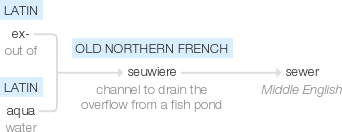Sewer
Middle English (denoting a watercourse to drain marshy land): from Old Northern French seuwiere ‘channel to drain the overflow from a fish pond’, based on Latin ex- ‘out of’ + aqua ‘water’.
wiktionary
From Middle English sewer, seuer, from Anglo-Norman sewere(“water-course”), from Old French sewiere(“overflow channel for a fishpond”), from Vulgar Latin *exaquāria(“drain for carrying water off”), from Latin ex(“out of, from”) + aquāria(“of or pertaining to waters”) or from a root *exaquāre.
From Middle English seware, seuere, from Anglo-Norman asseour, from Old French asseoir(“find a seat for”), from Latin assidēre, present active participle of assideō(“attend to”), from ad(“to, towards, at”) + sedeō(“sit”).
sew + -er
etymonline
sewer (n.1)
c. 1400, "conduit," from Anglo-French sewere, Old North French sewiere "sluice from a pond" (13c.), literally "something that makes water flow," from shortened form of Gallo-Roman *exaquaria (source of Middle French esseveur), from Latin ex "out" (see ex-) + aquaria, fem. of aquarius "pertaining to water," from aqua "water" (from PIE root *akwa- "water").
Specifically of underground channels for wastewater from c. 1600; figurative use of this is from 1640s.
sewer (n.2)
"one who sews," late 14c., agent noun from sew (v.).
